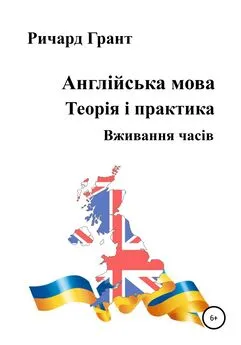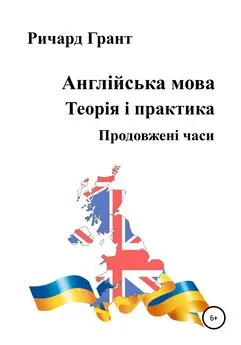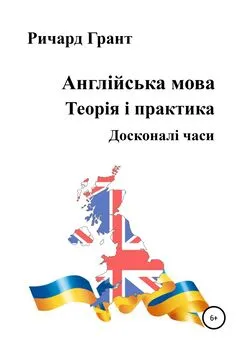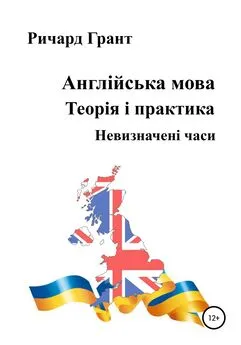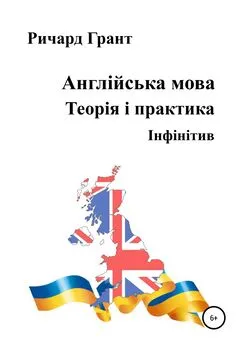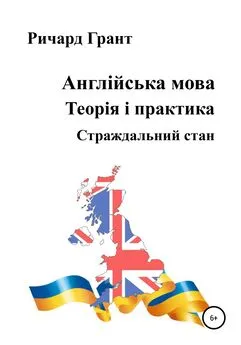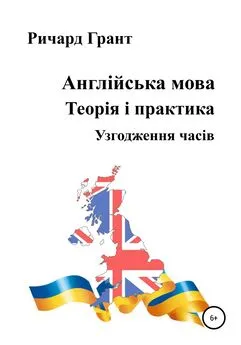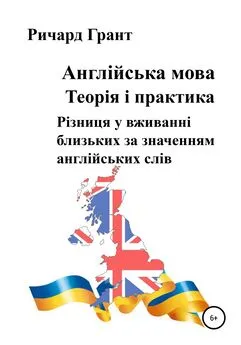Ричард Грант - Англійська мова. Теорія і практика. Вживання часів
- Название:Англійська мова. Теорія і практика. Вживання часів
- Автор:
- Жанр:
- Издательство:неизвестно
- Год:2021
- ISBN:978-5-532-94578-4
- Рейтинг:
- Избранное:Добавить в избранное
-
Отзывы:
-
Ваша оценка:
Ричард Грант - Англійська мова. Теорія і практика. Вживання часів краткое содержание
Освоївши теоретичний матеріал, представлений в цій серії і виконавши більше 600 вправ для самоконтролю, Ваш словниковий запас складатиметься з більше, ніж 6 000 англійських слів і виразів, що дозволить Вам успішно скласти такі міжнародні іспити по англійській мові, як TOEFL(Test of English as a Foreign Language), IELTS(International English Language Testing System) і інші.
Англійська мова. Теорія і практика. Вживання часів - читать онлайн бесплатно ознакомительный отрывок
Интервал:
Закладка:
Ричард Грант
Англійська мова. Теорія і практика. Вживання часів
Рiзниця мiж The Present Continuous i The Present Simple
1. Present Continuous застосовується для опису ситуацій і дій, які мовець вважає тимчасовими. Present Simple описує ситуації, які мовець сприймає як постійні.
Linda is working at the ice cream shop during summer. – Влітку Лінда працює в магазині морозива. (коли літо закінчиться, Лінда більше не буде працювати в цьому місці)
Sam works as a manager at the ice cream shop. – Сем працює менеджером в магазині морозива. (це його постійна робота)
2. Якщо ми описуємо повторювані дії, які пов'язані з цим моментом, використовуємо Present Continuous. А якщо з цим моментом вони не пов'язані, вживаємо Present Simple.
I'm speaking with my mom a lot these days. – Останнім часом я часто говорю з мамою по телефону. (є зв'язок з поточним моментом)
I speak with my aunt who lives in New York twice a year. – Двічі на рік я розмовляю зі своєю тіткою, яка живе в Нью-Йорку. (немає зв'язку з теперешнiм моментом)
3. Present Continuous описує дію, що відбувається зараз. Present Simple використовується для опису фактів, які залишаються вірними в будь-який момент часу.
Kathy is speaking with her father at the moment. – Зараз Кеті говорить зі своїм батьком. (вона говорить у даний момент часу, розмова буде закінчена)
Kathy speaks English. – Кеті говорить по-англійськи. (вона вміє говорити по-англійськи, це твердження залишається фактом в будь-який момент часу)
Вправа 1
Розкрийте дужки, вживаючи дієслова у Present Continuous або у Present Simple.
1. I ( to take) my sister to school now. I ( to take) her to school every day. 2. He ( to work) in the centre of Chicago. 3. Tom ( to play) football on Saturday. 4. His father ( not to watch) TV at the moment. He ( to sleep) because he ( to be) tired. 5. I ( to sit) in the waiting room at the doctor’s now. 6. I ( not to know) what to give my brother for his birthday. 7. I often ( to go) to see my friends in the evening. 8. You ( to keep) to any special diet? – Well, I ( not to think) it ( to be) good to eat a lot of meat. I usually ( to have) meat only once a week. I ( to eat) lots of fruit and vegetables. 9. He ( to help) his father now. He ( to help) his father very often. 10. He ( to work) in the centre of Chicago? 11. He ( not to play) football every day. 12. Pat ( not to cook) dinner at the moment. She ( to talk) on the phone. She ( to cook) dinner every Monday. 13. I ( not to work) in my office now. 14. They ( to want) to publish this book in July?
Вправа 2
Розкрийте дужки, вживаючи дієслова у Present Continuous або у Present Simple.
1. We sometimes ( to go) to the cinema or to a disco club on Sunday. 2. He ( to learn) English now because he ( to want) to get a better job. 3. At the moment they ( to go) to the river for a swim. They usually ( to go) to the river for a swim. 4. He ( not to work) in the centre of Chicago. 5. I ( to wear) a suit now. 6. I ( not to drink) coffee now. I ( to write) an English exercise. 7. Eric ( to talk) about his holiday plans, but Kenny ( not to listen) to him. He ( to think) about his new car at the moment. 8. She ( to think) he ( to drive) dangerously. 9. Andrew ( to get) up very early as he ( to live) far from school. He ( to be) never late. 10. The teacher ( to know) the girl often ( not to argue) with pupils. 11. She ( to play) the violin now. She ( to play) the violin every day. 12. They ( to read) a lot of books. 13. I ( not to wear) jeans now. 14. I ( not to drink) coffee in the evening. I (to drink) coffee in the morning.
Вправа 3
Розкрийте дужки, вживаючи дієслова у Present Continuous або у Present Simple.
1. My friend ( to live) in Toronto. 2. He ( to understand) that he ( to eat) noisily, but he always ( to forget) about it. 3. It ( to be) six o’clock in the evening now. Victor ( to do) his homework. His sister ( to read) a book. His mother and grandmother ( to talk). 4. I (to think) she often ( to worry). 5. I ( to read) now. I ( to read) every day. 6. They ( to read) many books? 7. My friend ( not to like) to play football. 8. Your friend ( to do) his homework now? 9. My cousin ( not to live) in Toronto. 10. Who that man ( to be) who ( to stand) in the doorway? – You ( not to recognize) him? It ( to be) John, my cousin. 11. I ( to write) a letter to my grandmother who ( to live) in Toronto. I ( to write) to her very often. 12. Barbara’s boss ( to see) she ( to be) always late for work. 13. He ( to sleep) now. He ( to sleep) every night. 14. They ( not to read) many books.
Вправа 4
Розкрийте дужки, вживаючи дієслова у Present Continuous або у Present Simple.
1. I ( not to read) now. 2. Your friend ( to go) to school in the morning? 3. The children ( not to sleep) now. 4. I ( to have) no time now, I ( to have) dinner. 5. It ( to take) me forty minutes to get to school. 6. I ( to call) my son in Chicago now. I ( to want) to call him every month but it ( to be) very expensive. 7. We ( to drink) tea now. We ( to drink) tea every morning. 8. The children ( to eat) soup now. 9. He ( to sleep) now? 10. Look! The baby ( to sleep). 11. The children ( to play) in the yard every day. 12. Your family ( to leave) Toronto in summer? – Yes, we always ( to go) to the seaside. We all ( to like) the sea. Mother ( to stay) with us till the end of August, but father ( to return) much earlier. 13. Hello, Pete, where you ( to go)? – I ( to hurry) to school. 14. You ( to hear) me now? How your job ( to go)? – Great! I ( to enjoy) it a lot. The only problem I ( to have) here ( to be) that the food ( to be) so good. I ( to eat) too much! I ( to get) really fat.
Вправа 5
Розкрийте дужки, вживаючи дієслова у Present Continuous або у Present Simple.
1. They ( to go) to school now. They ( to go) to school every morning. 2. The children ( to eat) soup now? 3. We ( not to go) to the country in winter. 4. The baby always ( to sleep) after dinner. 5. They ( not to go) to the stadium on Monday. 6. Where Tom and Nick ( to be) now? – They ( to have) a nice walk in the garden. 7. When your lessons ( to begin) on Monday? – They ( to begin) at nine o’clock. 8. Ruth ( to learn) English now because she ( to like) learning languages and she ( to want) to impress everybody. 9. I ( not to sleep) now. I ( not to sleep) in the daytime. 10. The children ( not to eat) soup now. 11. My sister ( to eat) sweets every day. 12. My grandmother ( not to work). She is on pension. 13. She ( to read) in the evening. 14. What you ( to do) here now? – We ( to listen) to tape recordings.
Вправа 6
Розкрийте дужки, вживаючи дієслова у Present Continuous або у Present Simple.
1. Where your sister ( to be)? – She ( to do) her homework in the next room. 2. Listen to that man! You ( to understand) what language he ( to speak)? 3. She ( not to drink) coffee now. She ( not to drink) coffee after lunch. 4. You ( to play) volleyball well? 5. She ( not to eat) sweets now. 6. My father ( not to sleep) now. He ( to work) in the garden. 7. She ( not to read) in the morning. 8. You ( to want) to see my father? – Yes, I …. 9. It usually ( to take) me an hour to do my written exercises. 10. Your English ( to get) better? – Yes, I ( to think) so. 11. We ( not to watch) TV now. We ( not to watch) TV in the morning. 12. When you ( to play) volleyball? 13. They ( to do) their homework in the afternoon. 14. I usually ( to get) up at seven o’clock in the morning.
Вправа 7
Розкрийте дужки, вживаючи дієслова у Present Continuous або у Present Simple.
1. She ( not to read) now. 2. Michael ( to know) German rather well. He ( to want) to know English, too, but he ( to have) little time for it now. 3. Where Boris ( to be)? I ( to look) for him. – He (
Читать дальшеИнтервал:
Закладка:
